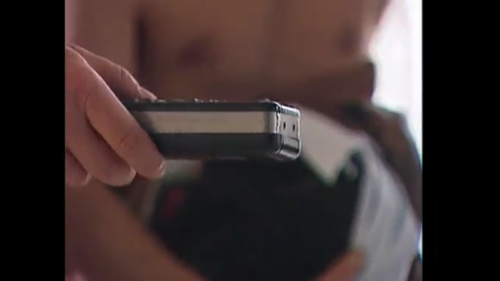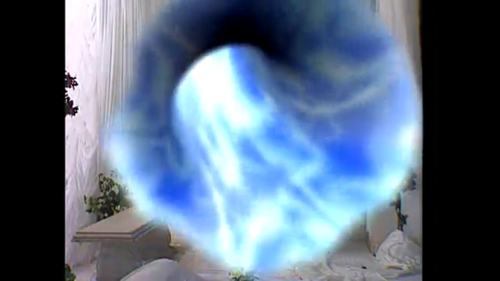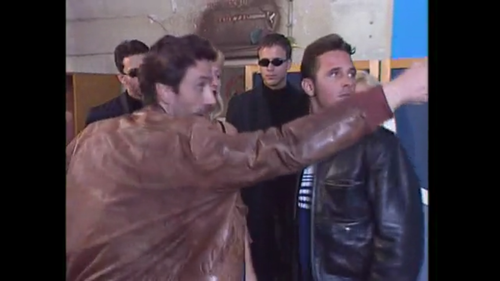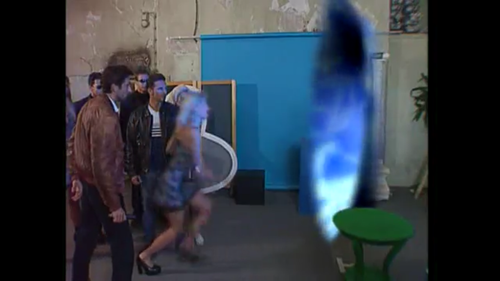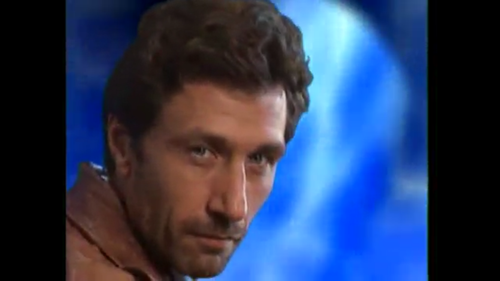Should anyone ever depend on an American television show for moral instruction? I don't know. It could be argued that I should have found something else. Every lesson learned from SLIDERS up to age 11 was a lesson lost by age 14 with Seasons 3 - 5.
My parents and I were not on civil speaking terms in my childhood, I had to work with what I had at age 10 and what I had to hand was SLIDERS.
In "Gillian of the Spirits," a double of Quinn Mallory's revered and beloved father, Michael, is revealed to be something else. He is an antagonist, a man who has been forced to act on behalf of greedy, manipulative figures who have armed him with a gun and directed him against innocent people, fueling him with desperation and self-preservation.
In the face of Michael's betrayal, Professor Arturo triggers the vortex and invites Michael to join the sliders. "A man shouldn't live unappreciated in his world," says the Professor, himself an unappreciated genius. The Professor empathizes with the man holding a gun to his chest, offering him a chance.
Quinn appears and appeals to his father's decency and better nature, urging him to lower his weapon. And before leaving, Quinn forgives his father, telling Gillian to pass on the message that Michael Mallory's son will always love him.
SLIDERS declares that it is a capital mistake to put anyone on a pedestal, an error to think that Michael Mallory in this world or any other would be a perfect and flawless specimen of humanity. Quinn himself notes in "Luck of the Draw": "You don't get something for NOTHING." That's not cynicism; that's understanding that people act in their own best interests for their own gains -- and to think otherwise is foolish.
"Gillian of the Spirits" doesn't declare that everyone is innately self-serving or inherently kind. It simply states that people have the capacity for good or evil. Malevolence is never beyond anyone; the Bayside Power bureaucrats are evil and manipulative. But redemption is never unattainable; it is within reach in every moment of choice such as when Michael is moved by the sight of his dead son and lowering his weapon. In addition, rather than try to have Michael act against his own goals, Arturo suggests that they can have mutual goals if Michael joins the sliders.
I understood this after watching "Gillian of the Spirits" at age 11 -- but then my grasp of human nature got shakier and shakier with each episode of Seasons 3 - 5. Season 4 declared Quinn was a hero even as he became callous and indifferent to the suffering of others, abandoned Wade in "Mother and Child," and then abandoned his home Earth and Rembrandt in "Revelations." Villains were villainous for the sake of being so. The rock star vampires in "Stoker," the Season 4 Kromaggs, the evil doctor in "Map of the Mind" -- they were antagonists and therefore evil despite lacking motives or meaningful gains.
I tried to distance myself from the show as this happened, but it's clear that it affected me. In my late teens and twenties, I lost my confidence in human nature; I became convinced that anyone and everyone would always exploit any vulnerability or opportunity to harm others.
Every person who hurt my feelings through any slights large or small was David Peckinpah -- a deranged, malevolent force turning my life into a horror movie for reasons unknowable and unfathomable. They were Colonel Rickman, a diseased slasher killer wandering into my life. They were the Season 4 Kromagg space Nazis, incompetent fascist poseurs. They were the arcade manager from "A Thousand Deaths."
This is undoubtedly the cause of my numerous social difficulties in my twenties.
When David Peckinpah overdosed and his heart gave out from drug abuse, SLIDERS fans rejoiced. I was largely silent, but one of Peckinpah's sons posted on the IMDB forums, describing his father's two decades of sobriety -- until 1994 when Peckinpah's 16 year old son Garrett died suddenly from meningitis. In his grief, Peckinpah fell back into his addiction, lost the ability to run a TV show, and it killed him in the end.
It was strange: Temporal Flux had told me about this painful chapter in Peckinpah's history, but it never truly registered until years later, when I was rewatching "Murder Most Foul," a splendid episode that demonstrates Peckinpah's clear talent as a writer and producer as well as his joyful obsession with historical re-enactment -- gifts that he unfortunately didn't bring to any episode of SLIDERS that he didn't write himself.
At the end of "Murder Most Foul," Quinn invites a little boy, Trevor, to join the sliders, but cautions that there is no way to bring Trevor home. Trevor declines, deciding to enjoy his childhood fully, but promises to someday build his own sliding machine and find the sliders.
An autobiography can lie. But fiction can't; what a writer creates reveals himself fully whether he wants it to or not. Trevor was named after one of Peckinpah's children, and it's obvious that Trevor's promise to find the sliders again someday voices Peckinpah's own longing to be reunited with the son he lost.
Transmodiar could not understand why SLIDERS REBORN insisted on bringing in the Season 3 monsters for the final script when I have never expressed anything but disdain for the Season 3 monsters. When I told him that "Regenesis" would be "warmly dedicated to David Ernest Peckinpah, screenwriter, director, producer and loving father, husband and family man," Transmodiar crowed, "As well it should! Because it celebrates all the wrong he brought to the show!"
But... I felt that Slider_Quinn21 understood it. Or at least acted like he did out of empathy and gentleness. Slider_Quinn21 worked with me so that the sequences of Wade, Rembrandt and Arturo fighting the dragon with aspirin and the dinosaur with hash butter and the underground predators with UV lights and the vampires with garlic puree were funny.
Slider_Quinn21 refined some of Rembrandt's quips and made sure that the sliders paid for all the items they took from the Doppler Superstore. Slider_Quinn21 also observed that the monster fighting sequences were far more interesting than Quinn and Quinn-2 firing sand and water through vortexes at each other, and he was very supportive of the conclusion of "Regenesis" where Quinn and Quinn-2 set aside their differences and work together.
At the time, I wanted the visual of the Season 1 - 2 team facing the Season 3 horrors with humour and levity -- but I see now that it was an effort to go back to "Gillian of the Spirits." People aren't against you; they are for themselves, but tragedy can sometimes make them think that poisoning themselves to numb their pain is their best route when it's not.
As Slider_Quinn21 would have to remind me in the course of my writing: people are not simply good or evil; they are capable of either and their ideas in themselves -- like doing horror movies with SLIDERS -- are not inherently good or bad until put into practice either with wit, charm, love and passion or grief, misery, indifference and contempt.
It's interesting that after "Murder Most Foul," David Peckinpah withdraws into monster movies rather than engaging in his gift for writing stories about older people interacting with younger people like Quinn and Trevor -- which is a talent Peckinpah shared with Tracy Torme given the excellence of "The Guardian." The age difference with Quinn and Wade being younger than Rembrandt and Arturo would have been perfect for Peckinpah's talents.
But never again would Peckinpah put his feelings about his children and his son into his writing; "Murder Most Foul" clearly struck too close to home; I wouldn't be surprised if "Trevor" had originally been "Garrett" only for Peckinpah to pull back. He didn't want to reveal his agony further; he withdrew from it; he tried to cauterize it with amphetamines and opiates. He fell into what a life of Annie Fish calls "cynicism. Of nihilism. Of existential horror taken to such a complete extreme as to become completely meaningless."
And I think that's why I unconsciously wrote SLIDERS REBORN's final script the way I did; to finish what Peckinpah started in "Murder Most Foul" but chose not to finish. "Regenesis" reveals that Dennis MacMillan didn't "drop out of graduate school to join a band"; he was caught stealing from a pharmacy which he did to try to settle his father's gambling debts, he failed and his father was killed.
"Regenesis" reunites Dennis with his restored father in the rebuilt multiverse and Quinn makes it happen, Quinn himself longing to be reunited with Michael Mallory. This is clearly an unintended yet obvious echo of "Murder Most Foul." At one point, Quinn asks his 15 year old daughter Laurel to trust him and Laurel snaps, "Trust you? I barely know you!" pointing out that they only learned of each other's existence 18 months previous and that they won't know if Quinn has what it takes to be a dad until Laurel is in her 30s -- another obvious reference to Peckinpah's misery over losing the time he should have had with Garrett.
These are the stories that Peckinpah should have written for SLIDERS. Not monster movies, not space invasions -- he should have written stories about sliding providing the opportunity to revisit tragedy and loss, not necessarily to erase them, but to address and recover from them. I see now that I wished to write the stories he should have for himself.
Because if you can forgive David Peckinpah for SLIDERS, you might be able to forgive anyone for anything and you might even be able to forgive yourself.


